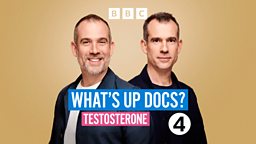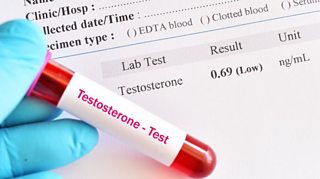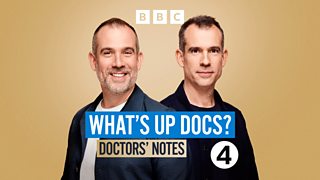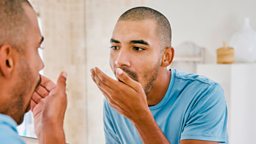Should you top up your testosterone?
Do you feel lethargic or low? Often exhausted by the end of the day? And are you bombarded with ads and celebrities telling you that testosterone replacement therapy (TRT) will put back the bounce in your step?
It’s hard to ignore the TRT phenomenon, but does it actually work and what are the risks?
In the What’s Up Docs? podcast, twins Chris and Xand van Tulleken ask what it means to have low testosterone and whether you should do something about it.

“Most men who are reading things on the internet, who are looking at popups with ideal body images, are searching for testosterone measurement for the wrong reasons,” says Dr Channa Jayasena. He leads a research group at Imperial College London treating people with reproductive problems and is an expert on how testosterone works in our bodies.
“So in other words, when you think, ‘I feel a bit tired. I've put on a bit of weight. I feel a bit low,’ these are very non-specific things that happen in normal life.”
What is testosterone and what does it do?
Testosterone is a hormone that is found in both males and females. It is the primary driver for puberty in boys, and helps to regulate sexual desire (libido) as well as mood and energy levels, for both men and women. In men, it is normal for testosterone levels to decline as they get older, particularly after the age of 40.
Six testosterone myths busted:
Myth 1: I am lethargic, have reduced sexual function and have put on weight. I must have low testosterone levels
Symptoms themselves don’t mean that you must have very low testosterone levels. Feelings of tiredness, lethargy, depression and disinterest in sex can be normal life problems.
There are a few specific symptoms and conditions which can suggest your testosterone is medically very low. For example, if you lose erections, have a low libido, are at a high risk of cancer, have lost a testicle or have experienced delayed or incomplete puberty. A GP can refer you to a consultant for investigation who may decide you could benefit from testosterone replacement treatment.

Myth 2: I’ve measured my testosterone levels and they are low. I would surely benefit from some TRT?
Not necessarily. It’s complicated.
After around age 40, men lose 1% of testosterone year on year. This drop is a normal symptom of ageing. So a low testosterone score doesn’t necessarily mean you need additional testosterone.
To decide if you need TRT, doctors should look at your symptoms and your testosterone score.
But if the score is in the middle and you are a middle-aged man, your symptoms may be caused by being overweight, having high blood pressure or high cholesterol and therefore it’s these issues that need treating, not your testosterone levels.
Myth 3: Testosterone treatment is entirely safe. It must be because a doctor is prescribing it to me
Global prescriptions for testosterone replacement therapy (TRT) have skyrocketed in recent years. But while TRT can be beneficial for those diagnosed with very low testosterone, it’s also associated with increased blood pressure and cholesterol in some individuals. Studies also suggest a link to heart disease but more research is needed.
Taking a large dose of testosterone is like adding a fan heater to your home when you already have a boiler – the body acts like a thermostat, detecting that there’s another source of testosterone and so decreases its own level of production.
Starting TRT requires a thorough discussion with your doctor to weigh your individual risks, benefits and alternatives.
Myth 4: Testosterone treatment is going to improve my sex life
Hardly. Studies show that testosterone offers the tiniest boost in sexual function, not much more than the placebo effect. You should weigh up this minor benefit against the risks of taking a strong drug with significant side effects, which can include things like acne, oily skin, breast enlargement, fluid retention, increased risk of blood clots, prostate problems and sleep apnea.

Myth 5: My testosterone is low and I can’t do anything about it
Not so fast. People who have problems with low testosterone tend to be less fit than they used to be. They might be overweight, obese or have diabetes.
Studies show that the people who have good testosterone levels ’till they're 80 are in better shape, are more active and are happier. Think of it as the positive ski slope effect: the more you do, the better you will feel, the less negative symptoms you will feel and the less your testosterone will decline.
Myth 6: I am a woman going through menopause, but TRT will help me
Menopause can cause a range of symptoms for women which can be very uncomfortable, including a drop in libido. Celebrities and adverts suggest testosterone is the answer, but the first port of call should be hormone replacement therapy (HRT) because it has lots of benefits including improved libido, getting rid of hot flushes and strengthening your bones.
While testosterone can increase libido, it's not advisable on its own because it lacks the other benefits of HRT. Testosterone can be added if your libido does not get better with HRT.
Listen to the testosterone episode of What's Up Docs?
More on testosterone
-
![]()
Do I need testosterone?
It’s been suggested to Dr Xand van Tulleken that he needs some testosterone replacement therapy - but should he take it?
-
![]()
Doctors' Notes: Testosterone
Chris and Xand dig deeper into the role of testosterone with hormones expert Dr Channa Jayasena.











